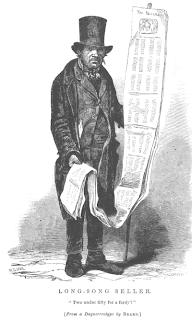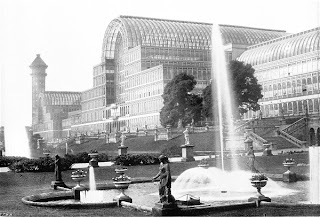THE INS AND OUTS OF LONDON
More from W.O'Daniel's tourist chronicle of an American in London ... find out about river-steamers ("The English river Steamboats, like London, its houses, streets and everything in or pertaining to London, are dirty coal-smoked crafts. "), a nice perspective on the Thames Tunnel ("Considerable value is attached to anything bought in the Thames Tunnel, and almost every article sold there, even the cakes and confectionary, has some picture or sentence concerning the work"), English hotels ("The American definition of a hotel is a building covering several acres of ground, in height, any number of stories above six. The interior of which is arranged and conducted with every consideration for the comfort and convenience of guests . . . The English definition is as contrary to this as it is possible to imagine"), and the funeral customs of the day ("Of all cold, formal, uncharitable, and un-christian-like sights to be seen in London, a funeral is certainly the greatest ...")
Tuesday, 27 March 2007
Thursday, 22 March 2007
Mayhew's Street Characters
 MAYHEW'S STREET CHARACTERS
MAYHEW'S STREET CHARACTERSA fun page for the website, pending a full digitisation of Mayhew's London Labour and the London Poor (a long-cherished plan, but not likely to appear in the imminent future) ... a large selection of the street characters from said masterpiece, on one page for your delectation ... click here
Sunday, 18 March 2007
London Pavements
LONDON PAVEMENTS
Books by foreign visitors often are the best reports of London life, as they tend to remark on things native Londoners would have taken for granted. Take this from W. O'Daniel, an American unimpressed by 1850s London streets (whose book I recently acquired ... more excerpts may follow):- "Judge then my disappointment on entering London to see no signs of that opulence so much talked of abroad; wherever I turn I am presented with a gloomy solemnity in the houses, streets and the inhabitants; none of that beautiful gilding which makes a principal ornament in Chinese architecture. The streets of Nankin are sometimes strewed with goldleaf: very different are those of London; in the midst of their pavements a great lazy puddle moves muddily along; heavy laden machines with wheels of unwieldy thickness crowd up every passage; so that a stranger instead of finding time for observation is often happy if he has time to escape from being crushed to pieces. The side-walks are exceedingly low and very narrow. Oxford, Regent, Cannon and a few other streets are the only exceptions. I have frequently seen brewers' teams and others come within one foot of the store windows, and have been obliged to jump into a store door to escape being struck. To walk two or three abreast in the city is perfectly impossible. In very few streets is there any protection to the curb and consequently the hubs of the wheels, especially when passing other teams, extends several inches over the side-walk. "
Books by foreign visitors often are the best reports of London life, as they tend to remark on things native Londoners would have taken for granted. Take this from W. O'Daniel, an American unimpressed by 1850s London streets (whose book I recently acquired ... more excerpts may follow):- "Judge then my disappointment on entering London to see no signs of that opulence so much talked of abroad; wherever I turn I am presented with a gloomy solemnity in the houses, streets and the inhabitants; none of that beautiful gilding which makes a principal ornament in Chinese architecture. The streets of Nankin are sometimes strewed with goldleaf: very different are those of London; in the midst of their pavements a great lazy puddle moves muddily along; heavy laden machines with wheels of unwieldy thickness crowd up every passage; so that a stranger instead of finding time for observation is often happy if he has time to escape from being crushed to pieces. The side-walks are exceedingly low and very narrow. Oxford, Regent, Cannon and a few other streets are the only exceptions. I have frequently seen brewers' teams and others come within one foot of the store windows, and have been obliged to jump into a store door to escape being struck. To walk two or three abreast in the city is perfectly impossible. In very few streets is there any protection to the curb and consequently the hubs of the wheels, especially when passing other teams, extends several inches over the side-walk. "
Friday, 16 March 2007
Mesmerism
 MESMERISM
MESMERISM The 1840s revival of interest in mesmerism led to all sorts of experiments, not least operations (including amputation) which relied on hypnosis as anaesthetic. Famously, Dickens was an amateur mesmerist, but the fad for mesmerism extended throughout society. I find this in The Times (one of several such cases mentioned) 22 Dec. 1843 ... "On Tuesday evening, at the Royal Oak, Abbey-street, Bethnal-green-road, the conversation turned upon the subject of "mesmerism," when a gentleman present (Mr. Elisha Harey of No.7, Ramsay-street, who has attended several lectures on the science) offered, for a trifling wager, to send any person into a "mesmeric sleep;" upon which the potboy, a fine active, intelligent youth, about 18 years of age, expressed a wish to be "mesmerised," and his wish was complied with. After a few minutes, the lad's arms and legs began to stiffen, the muscles of the throat appeared to swell, and he gave utterance to a low moaning expressive of great pain. At this time, Mr. De Llenen, the landlord of the house, entered the room and endeavoured to arouse him, but without success. After a lapse of about an hour, the party became alarmed, and a medical gentleman (Mr. Vandenberg) was sent for; but, nothwithstanding every attention has been paid to him, up to the present time he had remained in the same state. Several other medical gentlemen have since seen the lad, but none seem to be aware what course to pursue with respect to him." What became of him, I wonder?
Tuesday, 13 March 2007
A Crystal Palace Postcard
Thursday, 8 March 2007
Mayhew on Carpenters / Joiners
MAYHEW ON CARPENTERS / JOINERS:
Further to the post below, another Mayhew letter (no.60), this time on carpenters and joiners.
"The carpenters and joiners that work for the low speculating builders are, generally speaking, quite a different class of men to those who are in "society." As a rule, to which, of course, there are many exceptions, they are men of dissipated habits. What little they get I am assured is spent in beer or gin, and they have seldom a second suit to their backs. They are generally to be seen on a Sunday lounging about the suburbs of London with their working clothes on, and their rules sticking from their side pockets - the only difference in their attire being, perhaps, that they have a clean shirt and a clean pair of shoes."
Read it in full here.
Further to the post below, another Mayhew letter (no.60), this time on carpenters and joiners.
"The carpenters and joiners that work for the low speculating builders are, generally speaking, quite a different class of men to those who are in "society." As a rule, to which, of course, there are many exceptions, they are men of dissipated habits. What little they get I am assured is spent in beer or gin, and they have seldom a second suit to their backs. They are generally to be seen on a Sunday lounging about the suburbs of London with their working clothes on, and their rules sticking from their side pockets - the only difference in their attire being, perhaps, that they have a clean shirt and a clean pair of shoes."
Read it in full here.

